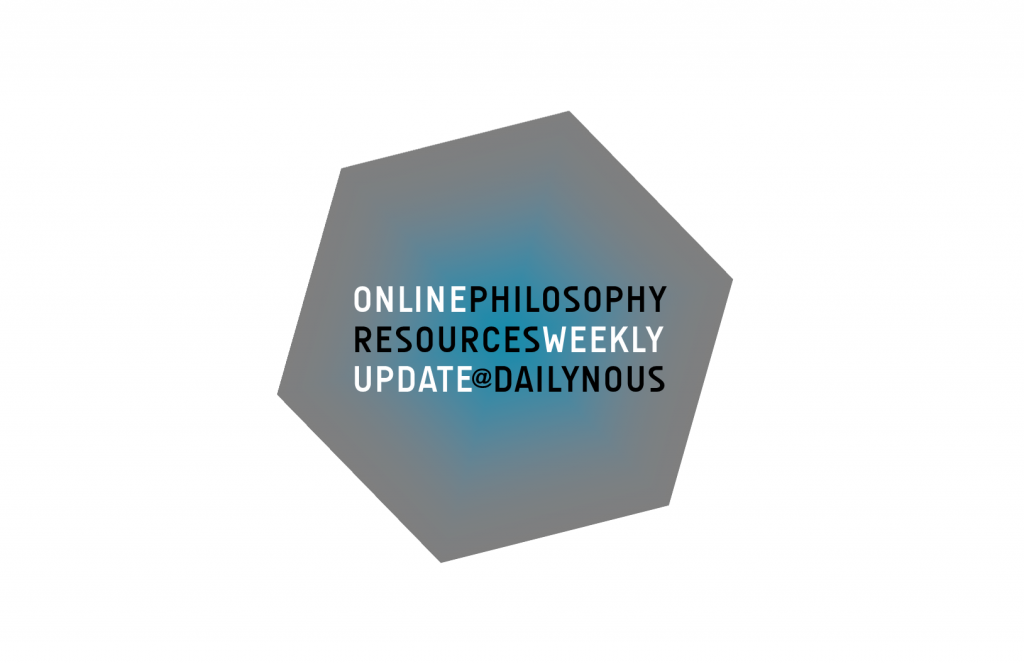Online Philosophy Resources Weekly Update
Here’s the weekly report on new and revised entries in online philosophy resources and new reviews of philosophy books.

New:
- Protagoras, by Mauro Bonazzi (Urecht).
- Boethius of Dacia, by Sten Ebbesen (Humboldt).
Revised:
- Dualism, by Howard Robinson.
- Distributive Justice and Empirical Moral Psychology, by Christian B. Miller.
- Eugen Rosenstock-Huessy, by Wayne Cristaudo.
- Quantum Mechanics, by Jenann Ismael.
- Multiculturalism, by Sarah Song.
- Paternalism, by Gerald Dworkin.
- Practical Reason and the Structure of Actions, by Elijah Millgram.
- The Definition of Morality, by Bernard Gert and Joshua Gert.
- Nicolaus Taurellus, by Andreas Blank.
IEP ∅
NDPR ∅
1000-Word Philosophy ∅
Recent Philosophy Book Reviews in Non-Academic Media
- Sick Souls, Healthy Minds: How William James Can Save Your Life, by John Kaag, reviewed by Andrew Stark at Times Literary Supplement.
- How to Be a Conservative, by Roger Scruton, reviewed by Andrew Koppelman at New Rambler Review.
- Spinoza’s Ethics, translated by George Eliot, edited by Claire Carlisle, reviewed by Moira Gatens at Australian Book Review.
Compiled by Michael Glawson
BONUS: New solution to demarcation problem.



Re: the SEP entry on the definition of morality
Here we go again … this is getting tiresome: Although there is reference to a well-known book (and its corresponding argument) by the philosopher David B. Wong in this entry, there is no attempt whatsoever to examine the meaning of morality from vantage points provided by non-Western worldviews, which includes the philosophical dimensions of same. By now, the editors at the SEP should know better, inviting authors such as those here to collaborate with contemporary philosophers well-versed in, say, Indic and Chinese philosophies, when authors of entries such as this evidence no knowledge or appreciation of non-Western perspectives, if only to “test” the dominant views! The topic of the entry “is not—at least directly—[about] moral theory,” but in the first place about “identifying the target of moral theorizing.” And this implicates morality’s treatment in both a descriptive and normative sense, bringing us back to theory. For this and other reasons, one might look, for example, at A.S. Cua’s contribution, “Reflections on Moral Theory and Understanding Moral Traditions,” in Gerald James Larson and Eliot Deutsch, Interpreting across Boundaries: New Essays in Comparative Philosophy (Princeton University Press, 1988): 280-293. Consideration of non-Western worldviews/philosophies is not intended in any way to disparage or diminish the contributions those (canonical) philosophers in the West who have shaped our understanding of morality. It is just to admit that they may not—and of course should not—have an intellectual monopoly or patent on such topics, that intellectual, philosophical and cultural imperialism of this sort should be, by now, passé. Given the multifarious consequences, for better and worse, of capitalist and other forms of globalization, it strikes this reader that professional philosophers should feel an obligation to cultivate the requisite cosmopolitan (or cosmopolitan-like) sensibilities, be they predominantly hedgehogs or foxes, either dispositionally “moral” or theoretical, either primarily inferential, discursive, and demonstrative on the one hand, or rhetorical, evocative and axiological on the other.